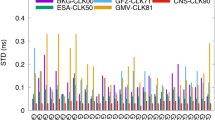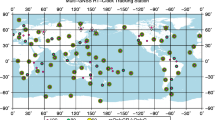Abstract
Realtime satellite clock corrections are usually estimated using undifferenced phase and range observations from a global network. Because a large number of ambiguity parameters must be estimated, the computation is time-consuming. Consequently, only a sparse global network of limited number of stations is processed by most IGS Realtime Analysis Centers with an update rate of 5 s. In addition, it is very desirable to build the capability to simultaneously estimate clock corrections for multi-GNSS constellations. Although the estimation can be sped up by epoch-differenced observations that eliminate ambiguities, the derived clocks can contain a satellite-specific bias that diminishes the contribution of range observations. We introduce a computationally efficient approach for realtime clock estimation. Both the epoch-differenced phase and undifferenced range observations are used together to estimate the epoch-differenced satellite clocks and the initial clock bias for each satellite and receiver. The biased clock corrections accumulated from the estimated epoch-differenced clocks are then aligned with the estimated clock biases and provided as the final clock corrections to users. The algorithm is incorporated into the EPOS-RT software developed at GFZ (GeoForschungsZentrum) and experimentally validated with the IGS global network. The comparison with the GFZ rapid products shows that the accuracy of the clock estimation with the new approach is comparable with that of the undifferenced approach, whereas the computation time is reduced to one-tenth. As a result, estimation of high-rate satellite clocks from a large reference network and tracking satellites of multi-GNSS constellations becomes achievable.








Similar content being viewed by others
References
Agrotis L, San PA, Dow J, Zandbergen R, Svehla D, Ballereau A (2010) ESOC’s RETINA system and the generation of the IGS RT combination. IGS workshop, 28 June–2 July 2010, Newcastle Upon Tyne, UK
Bar-Sever Y, Muellerschoen R, Reachert A, Vozoff M, Young L (2001) NASA’s internet–based global differential GPS system. In: Proceedings of NaviTech ESA/ESTEC, Noordwijk, The Netherlands, pp 65–72
Bar-Sever Y, Bell B, Dorsey A, Srinivasan J (2003) Space applications of the NASA global differential GPS system. Institute of Navigation, ION GNSS2003, 9–12 Sept 2003, Portland, Oregon, USA
Bock H, Dach R, Jäggi A, Beutler G (2009) High-rate GPS clock corrections from CODE: support of 1 Hz applications. J Geod 83(11):1083–1094. doi:10.1007/s00190-009-0326-1
Collins P (2008) Isolating and estimating undifferenced GPS integer ambiguities. In: Proceedings of ION national technical meeting, San Diego, CA, US
Collins P, Gao Y, Lahaye F, Héroux P, MacLeod K, Chen K (2005) Accessing and processing realtime GPS corrections for precise point positioning—some user considerations. In: Proceedings of ION GNSS 18th international technical meeting of the satellite division, Long Beach, CA, US
Dixon, K (2006) StarFire: A global SBAS for sub-decimeter precise point positioning. In: Proceedings of ION GNSS 2006, 26–29 Sept. 2006, Fort Worth, TX, USA, pp 2286–2296
Ge M, Gendt G, Rothacher M, Shi C, Liu J (2008) Resolution of GPS carrier-phase ambiguities in precise point positioning (PPP) with daily observations. J Geod 82(7):389–399. doi:10.1007/s00190-007-0187-4
Ge M, Chen J, Gendt G (2009) EPOS-RT: software for realtime GNSS data processing. Geophysical research abstracts, vol 11, EGU2009-8933, EGU general assembly 2009, Vienna, Austria
Geng J, Teferle FN, Meng X, Dodson AH (2010) Kinematic precise point positioning at remote marine platforms. GPS Solut. doi:10.1007/s10291-009-0157-9
Hauschild A, Montenbruck O (2009) Kalman-filter-based GPS clock estimation for near realtime positioning. GPS Solut 13:173–182. doi:10.1007/s10291-008-0110-3
Kouba J (2009) A simplified yaw-attitude model for eclipsing GPS satellites. GPS Solut. doi.10.1007/s10291-008-0092-1
Laurichesse D, Mercier F, Berthias JP, Bijac J (2008) Real time undifference ambiguities fixing and absolute RTK. In: Proceedings of ION national technical meeting, San Diego, CA, USA
Melgard T, Vigen E, de Jong K, Lapucha D, Visser H, Oerpen O (2009) G2—The first realtime GPS and GLONASS precise orbit and clock service. In: Proceedings of ION GNSS 2009, 22–25 Sept 2009, Savannah, GA, USA, pp 1885–1891
Mervart L, Lukes Z, Rocken C, Iwabuchi T (2008) Precise point positioning with ambiguity resolution in realtime. In: Proceedings of ION GNSS 2008, 16–19 Sept 2008, Savannah, GA, USA, pp 397–405
Mireault Y, P Tétreault, F Lahaye, P Collins, M Caissy (2008) Canadian RT/NRT products and services. IGS workshop 2008, 2–6 June 2008, Miami Beach, Florida, USA
Pérez J, Agrotis L, Fernández J, Garcia C, Dow J (2006) ESA/ESOC real time data processing. IGS workshop 2006, 8–11 May 2006, Darmstadt, Germany
Schaer S, Steigenberger S (2006) Determination and use of GPS differential code bias values. IGS Workshop 2006, May 8-11, Darmstadt, Germany
Zhang Q, Moore P, Hanley J, Martin S (2007) Auto-BAHN: Software for near realtime GPS orbit and clock computations. Adv Space Res 39(10):1531–1538
Zhang XH, Li XX, Guo F (2010) Satellite clock estimation at 1 HZ for realtime kinematic PPP applications. GPS Solut (in press) doi:10.1007/s10291-010-191-7
Acknowledgments
We are grateful to two anonymous reviewers and Professor Yanming Feng for their valuable comments and suggestions.
Author information
Authors and Affiliations
Corresponding author
Rights and permissions
About this article
Cite this article
Ge, M., Chen, J., Douša, J. et al. A computationally efficient approach for estimating high-rate satellite clock corrections in realtime. GPS Solut 16, 9–17 (2012). https://doi.org/10.1007/s10291-011-0206-z
Received:
Accepted:
Published:
Issue Date:
DOI: https://doi.org/10.1007/s10291-011-0206-z




